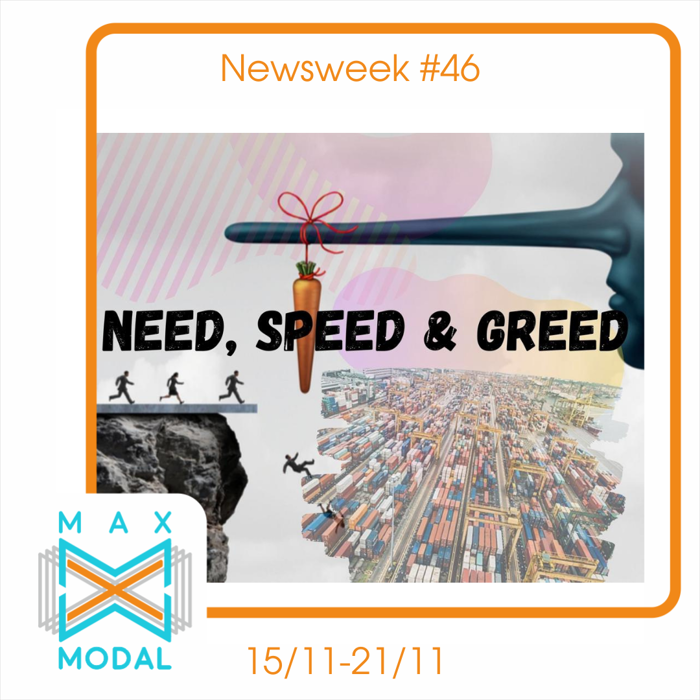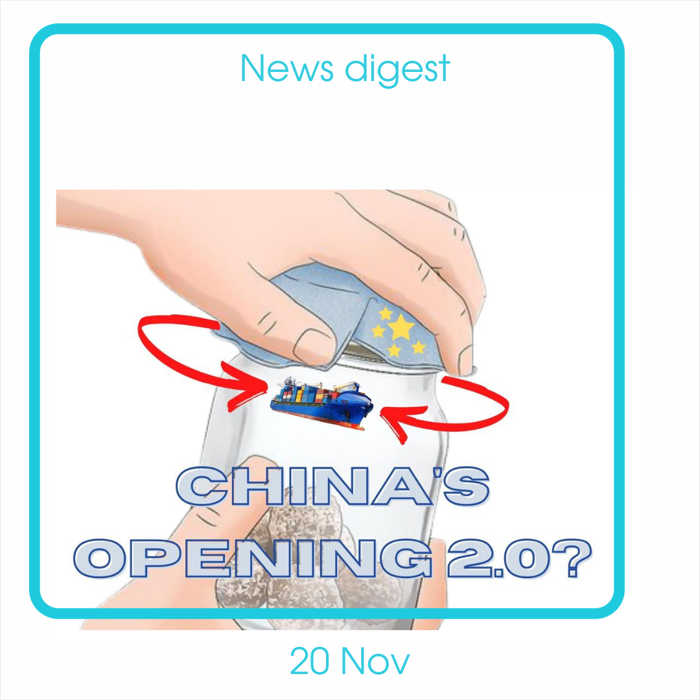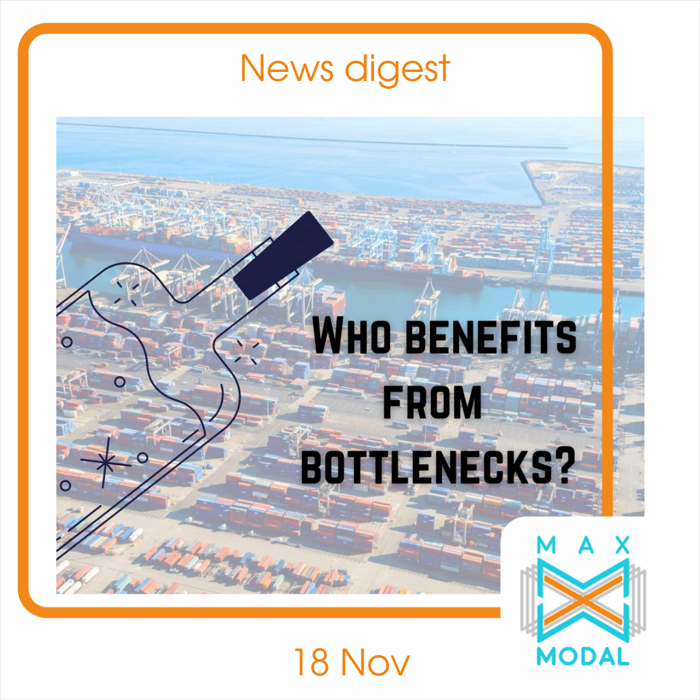All bomond of containers business of Russia at the conference "Transcont 2021" in Moscow tommorow. MAXMODAL will take part too. Dinar Gainutdinov will tell about trends container business and multimodal network.
Companies have already decided not to wait for the peak season to hit and dived into hyperdrived sales before supply chain snags cut off the flow of merchandise. A way to cover increased operating costs.
This Thanksgiving not only a turkey will be subject to share but also elevated costs that retailers are facing due to increased rent fees, labor expenses, and decreased stocks. Thus, industry giants are on the run to adjust their strategies and test the waters before the Christmas rush hits the stores by regulating FBA fulfillment fees to partially offset the higher permanent operating costs. On average, the increase will be by 5.2%. Sales in November and December are predicted to grow between 8.5% and 10.5% from last year. In addition, such companies as Amazon are raising monthly off-peak storage fees together with removal and disposal fees, and introducing a tiered rate structure for long-term storage and dim-wight pricing for large standard-size products. No one is Immune to the persisting pressure. However, the first signs on the US market indicate potential positive changes next year as inventory levels have re-bound to the pre-pandemic levels. If the consumer demand abates, this dynamic will continue, although the move to higher levels of stock held in by wholesalers brings its own set of problems. There is still no space in the warehouses that is slowing the movement of goods and containers through the supply chain. As the result, the industry gets stuck in congestion. Companies continue altering their services from North America, Latin America, and the Caribbean. Australia is under a huge risk of becoming a “no go” area as well since it is becoming more difficult to book cargo slots and container detention charges keep mounting. Cyber-attacks at container deport operators additionally disrupt the situation. In the meantime, some become creative when addressing equipment shortages. South Korea teams up with a factory in Vietnam to start its own container manufacturing process. The location allows cutting costs related to land and labor expenses.
The global character of the crisis makes the recovery more complicated. Despite the slight aforementioned improvements, the freight costs will remain exceptionally high and consequently drive an increase in prices. Experts predict that on a global scale import price levels could jump by 11%. Recent data proves that the main problem in disrupted schedule reliability is poor service rather than constantly blamed high spot rates. Another tumbling stone is whether shippers are at all willing to pay a premium for better schedule reliability.
An additional overview of the current trends and their effects will be delivered by the FMC shortly to help the flow of cargo through the international supply chain. Transparent data sharing will be the next initiative to be implemented. Another initiative to address the logjam at the ports has sparked the talks in the State – the proposal to launch a new line between the US and China that will use 53-foot containers. While it is still in the talks, Amazon reportedly has backed it. The transpacific direction will play a key role in the future recovery. Currently, the freight transit time remains extremely high. For example, a 32-day transit time is still 68% higher than it was in May 2021 and double the usual transit time. It means that delays are happening at every step, even when containers are unloaded. Apart from transit, delays concern berthing and dwell time. To illustrate the chaos, there are currently around 78 container ships in the queue outside San Pedro Bay. The best way for the companies to avoid continuous delay so far has been the approach to have their own terminal facilities at congested ports.
Alternatively, they can follow the UK’s example that illustrates how the country has shifted its focus at the development of the freeports eco-systems. The new steps aim to attract businesses, thus anyone willing to set up a new manufacturing, clean energy or logistics business at the Thames Freeport will benefit from the access to tangible economic benefits which are available across the main tax sites. This alone will allow companies to reduce ownership costs by 50% - a miracle in our times when the prices keep rising.
When the marine sector fails, it is usually the rail that is put on the pedestal of the hopes and dreams of the future. It has seemed like all leaders have been calling for more investments in railway infrastructure, however, the new studyhas shown that the reality is far from what the media has painted. There is no sign of a modal shift to rail and it is the road sector that is a current priority, at least for the EU. Between 2007 and 2020 82.5 billion went to roads and motorways in comparison to 62 billion euros for rail. The numbers speak for themselves. At the same time, MSC sees inland transportation as a big opportunity and plans to provide a new overland service that will ensure a shorter journey for cargo bound for Saudi Arabia and other Gulf Cooperation Council countries. It will be of particular interest to those shippers that deal with refrigerated cargo. The company also does not slow down on expanding its fleet targeting the second-hand market. The advantage of this strategy is simple: instead of waiting for years for the vessels to be built, MSC will receive them in a much shorter time. Another four ships will join the marine giant’s forces.

Shipping lines have done unimaginable and destroyed even the tech atlantes. A wracking ball that is worthy billions of dollars.
Shipping lines triumph has taken off. Now they definitely have everyone’s attention, even of those who come from different industries such as tech. The reason for it is their resounding success in surpassing the profits of the biggest companies such as Facebook, Amazon, Netflix, and Google. It is difficult to recall any other industry that managed to achieve such accomplishment especially in the time of the crisis. The wealth of some of the marine giants reportedly reaches up to $5.6 billion, a massive growth from $567 million in the same period last year. The records do not end just there. Despite the persisting bottlenecks, the Port of LA is still being number one in handling TEUs. The updates report 902,644 TEU, which is an 8% decrease from last year, however, the overall cargo is up to 22%. More is yet to come with agencies forecasting a record holiday season coming up. However, the industry knows the examples when too rigid anticipation for growth has caused inventory backlogs. Besides, the situation is perplexed with China’s recent decision to ban many reefer shipments through the port of Dalian due to the COVID outbreak. Hapag-Lloyd is advising customers to divert reefer containers to other ports such as Tianjin and Qingdao. Such drastic contrast – either cosmic profits or earnings going down 50% in other sectors is causing extraordinary volatility in the shipping sector. It is an extremely tricky time for the investors as, accosting to experts, the “level of whiplash” over the past couple of years, has been bruising even for the most nimble ones.
The geographic area of booming TEUs is not limited just to the US – Australia previously announced its skyrocket demand, and, according to the October assessment, the Port of Sydney has handled 1 million containers. Since the dynamic is not going to slow down, the port authorities realize the importance of clearing out the space. Apparently, the best way to make shippers move is to threaten them with dwell fees. It worked in the beginning and is working now. The number of container vessels waiting in San Pedro Bay to unload at the ports has dropped from a high of 83 on November 12 to 61 on November 22. Way to go for the ports of LA and Long Beach. In the meantime, the latter has been connected with South China thanks to the linkage introduced by Orient Overseas Container Line.
Rail has also enjoyed its fair share of the blooming volumes, although not without operational problems that arise due to political tension with China and even the ghost of suspension in operation with Lithuania. Congestion in Kaliningrad brought its disruptions as well because the city was a promising transition hub to Belarus. It is reported to remain severe, so China Railway Express trains are gradually shifting back to the Mala-Brest rail line. Meanwhile, Ukraine takes the complicated context as a chance to promote itself as an alternative gateway to Western Europe and is building a 100,000 teu-capacity terminal at Mostyska, on the border with Poland. The expansion of any kind requires significant investments, and in the case of Turkey, the government is planning to increase financial contributions by 60%. The Kars Logistics Centre is in the spotlight as it is the primary tool of the government’s policy to attract more traffic from the New Silk Road via Turkey. In addition, it is aiming to influence the main traffic flows passing through Russia. Is it realistic or ambitious? However, not all initiatives coming from “above” are destined to be accepted. The UK’s Integrated Rail Plan has received negative feedback from the Railway Industry Association. The document was a long-awaited one, but after it was out, it confirmed the speculations that rail projects in the north of England would be scaled back or abandoned. The representatives of the national trade body have voiced their readiness to cooperate and discuss the further steps at the round table. The situation is much clearer in Vancouver now as the storm has died down and Canadian Pacific will restore rail service in British Columbia. A new line connecting Italy and France will also be launched shortly. Calais-Domodossola line will be available for all types of units and it is the first time when Cargobeamer has its own terminal, which makes the work more efficient now. Another advancement in intermodal has seen the light in Poland where Contargo has established a national company. The world can potentially see a new promising player in Eastern Europe, especially since with an annual transport volume of 2.1 million TEU, Contargo is one of the largest container logistics networks in Europe.
Airfreight has definitely been hit among the hardest with the jumped demand and won the pedestal of the most under-invested in the recent news headlines. To address the pain points, DHL is going to expand its international fleet with a far-reaching forecast that the global freighter fleet will be 70% larger than the pre-pandemic fleet by 2040. Beyond added capacity, the additional freighters will allow DHL to fly eco-friendlier and more cost-efficiently. Rival Airbus is also benefiting from growing freighter demand, thanks to the orders made by CMA CGM Group.

Worldwide bottlenecks have been around for weeks now and, although local governments are spending millions of dollars and port authorities are trying numerous strategies from 24/7 work schedules to lifting restrictions, the situation goes on. The benefits that shipping lines and, apparently, forwarders are preventing congestion from resolving. The snail pace that the latter are picking up their containers causes more delays, and even FMC does now have enough regulatory tools to interfere. However, not everything is stuck – California’s ports report improvement. Meanwhile, the East is planning major changes as well with China intending to make the local ports more attractive to foreign investments.
Investments are the key indeed, and airfreight knows it like no other. Years of the lack of financial funding have resulted in the inabilities of the sector across the current crisis. Even with the introduction of new services, the increased capacity adds nothing to the battle against congestion and sky-high cargo rates. It is crucial to keep in mind that not only traditional horsemen of the crisis (shortages, congestion, elevated rates) can add logs to the fire, but the weather as well. Canada’s railways and ports are struggling with floods, and there are no alternatives to divert the traffic. Will new technologies and digitalization speed up the transition to more resilient systems? Follow MAXMODAL for more updates.

With a creak, at a snail pace, but finally the closed-off systems start to lift cabotage restrictions to make ports more attractive. Nothing calls for action better than the need for foreign investments.
The need for more space and services will eventually open up even the most closed-off systems and the Chinese one is no exception. If previously foreign liner operators could not offer transport services between Chinese ports, or circumvent cabotage restrictions by chartering or buying slots on China-flagged ships, now things are about to change. The authorities have decided to temporally lift the restrictions. The next steps will probably include relaxation of cross-border payment, overseas consumption and the flow of people because the recovery is simply impossible without foreign investment. The Chinese government is aware that it has to make ports more attractive to international partners especially during this unprecedented time when the spot rates dynamic remains uncertain. On the one hand, there are offers from Chinese-based forwarders, with prices down to $13,000 per 40ft for mid-December, and on the other – for Mediterranean ports from Asia some indexes were unchanged, at $12,420 and $13,168 per 40ft. The troublesome congestion at California’s ports continues to have a strong grip around shippers’ throats and many experts report that significant rate reductions across liner trades could take almost three years. Although the US ports reportedly are making progress toward easing supply chains – the goods movement is now faster. The main problem is now the fact that the rise in the cost of shipping between Asia and the West Coast has made it is more profitable for the ocean carriers to quickly load empty containers or return without a full ship instead of waiting for loaded containers to get into the port. The global alliances dominating the sector make it difficult to resolve this issue as their influence is hard to combat. The White House has again underlined the harmful effect of the monopoly on export and import for the marine sector. The country knows its “heroes” – 2M, Ocean Alliance, and THE Alliance – control about 80% of the global liner shipping market and 95% on the East-West trade lanes, according to the latest analysis. FMC has been promising to take action for weeks, but the destiny of competitions of American ports is still at mercy of the big players. Perhaps, the promising stimulus of expanding the FMC’s $30m annual budget will become the needed measure. The battle with major companies takes place outside of the US as well. In Abu Dhabi, the growing presence of DP World is pushing Abu Dhabi Ports to boost the fleet by ordering its third ship, ready to serve the Persian Gulf and Indian sub-continent.
However, adding capacity gives no guarantees that the situation will improve, and airfreight is a great example of this premise. Despite the new services, air cargo rates have climbed further. Europe-US ones go up 4% to the East Coast to $5.24/kg, and hit $6.08 to the West Coast, which is a 10% increase since the start of the month. Demand and congestion are to blame which once again highlights the importance of addressing all the key issues altogether, instead of concentrating solely on one because they limit how much cargo can be processed regardless of the space on a plane. Hence, the added capacity makes no difference.
Meanwhile, the idea of free ports, special areas with different regulation that includes tax incentives, has finally gotten its spin-off with the opening of the UK’s first new freeports for business. Now businesses situated along the Thames will potentially reduce the cost of ownership by 50%. In addition, a collaboration between port operators DP World and Forth Ports, Thames Freeporthas become an economic zone connecting Ford’s Dagenham engine plant and the global ports at London Gateway and Tilbury. The goal is to make it a customs sub-zone. Russia hops on the port development train and focuses on the construction of a major transshipment hub on the Baltic Coast. The facility is planned to be able to transport a cargo turnover of up to 65 million tons/year at the seaport of Primorsk. Possibly, the new terminals will soon be filled with zero-emission boxships. For the start, the first one has already completed its maiden voyage in the Oslo fjord. It is the result of the collaboration between The Yara Birkeland and Kongsberg. It will cut 1,000 tonnes of CO2 and replace thousands of trips by diesel-powered trucks a year. Way to go to the green future.
Eco-friendly transportation solutions have hit intermodal sector as well. CMA CGM is going to work on two new dedicated block-train service offering in Germany. It will be able to handle a weekly capacity of 96 TEU, connecting with the services from and to Asia. However, Asian railways are not operating smoothly. After the renewal of the railway trade between China and North Korea, it was shut again due to the new COVID outbreak. This time the closure probably will not last long as both sides can no longer bear financial losses. Canada, on the other side of the world, knows all about losses caused by the weather. Floods have cut all rail freight traffic to and from the port of Vancouver. The companies are trying to divert the traffic to the US, but floodwaters from the Nooksack River have poured across the Canada-U.S. border.

While some are working to the bone to resolve notorious bottlenecks, others are enjoying the occurred opportunity to use ports as a free space for storage. The classic game of winners and losers.
The most vulnerable business affected by global congestion turn out to be the importers and distributors fighting to meet delivery deadlines. Shippers are complaining about queuing vessels, an inexplicable shortage of containers, and poor service from the shipping lines. However, the latter believe that consumer demand will slacken and capacity and resilience will get back on track. Of course, the shipping lines are peacefully advocating for the positive predictions as they are going to break the record in profits thanks to the current context. Cosco alone reports nine month profits skyrocketed up 1 650% in the light of soaring demand and volumes. Zim follows suit generating its highest ever quarterly net income of $1.46 billion. Others make their presence by strengthening regional presence in the main areas. Shipping lines are the true royal now especially when their customers are hunting after long-term contracts. They are taking on millions of dollars in forward charter commitments on vessels well beyond the delivery dates of large swathes of newbuild tonnage that will hit the seas in the coming years. The new survey has revealed that expiring charters will now peak in 2024. Thus, the shipper’s point of view is more realistic – the marine congestion will take time to resolve and the pace, with which spot rates are dropping, is going to determine future competitiveness of the market Meanwhile, forwarders are not hurrying to pick up their containers, especially since the dwell fees have been postponed until the middle of November as container flow significantly improves. Seems like a great strategy to use ports for the free storage. That is why FMC is going to take matters regarding the return of containers to the marine terminals in its hands by creating several responsible teams. The teams will focus their efforts on improving conditions at the Ports of Los Angeles and Long Beach, New York and New Jersey.
Infrastructure that is failing to satisfy the current consumer demand needs to be developed as well, otherwise, huge losses are inevitable. Experts warn that the prices that people are paying for ocean freight right now add between 5% and 10% to the cost of all the purchases. Taking into account that 90% of the consumed goods are moved on container ships, the influence of the marine sector is predominant when it comes to recovery. With Christmas just around the corner, everyone’s wish for the festive season is quite easy to predict: to have spot rates at a decreasing pace, although the marker is no miracle. The new dynamic is definitely the sign of the coming changes, but it might take another 18 to 30 months for the rates to reset.
Economic relations among the players on the grand chessboard will not be the only determining factor of the awaited stability. Although it may seem that in today’s globalized world market influence is the strongest, there is still room for geopolitics. The rail ties strengthened by the New Silk Road are already playing a crucial role in transportation, and their future depends on the evolution of the contradictions between the US and China especially since China is now more west-oriented. The volumes of goods that are transported by rail across the continents continue to increase. From 2016 until 2020, these volumes grew 7.9 times. Meanwhile, the EU infrastructure is going through a metamorphosis. The upcoming revisions of the TEN-T and Rail Freight Corridor Regulations of the European Commission are now in the talks and digitalization will be the forwarder. Experts collectively agree that the future is behind European Traffic Management System, Automated Train Operation, and digital traffic management systems, etc. Green agenda also does not leave the round tables in the context of rail influence.
In the meantime, the growing demand for clean energy has encouraged the launch of the world's largest LNG tank container ship.Yangzijiang Shipbuilding will use Tiger Maanshan and its sister ships to carry LNG from Malaysia to China, having signed a shipping contract with its partners. With all this potential, the green sector has to have the same regulations as any other one, and they are already here. The US Environmental Protection Agency has assessed penalties of $81,474 against two MSC’s ships reporting violations in California and Louisiana regarding improper management of ballast water. Carbon-free initiatives and clean energy technologies are a great thing, but the rest of the environmental measures must not be neglected.
However, financial constraints can easily disrupt hopeful plans. The latest example is the Port of Rotterdam where the lack of money for train maintenance causes major consequences for its accessibility. With the implementation of the sustainable requirements and cyber security that the government was aiming for, the costs are going to increase and it will significantly postpone the development. Issues with accessibility have been the headache for Canada as well due to severe weather conditions disrupting cargo flows between the port of Vancouver and the interior.








